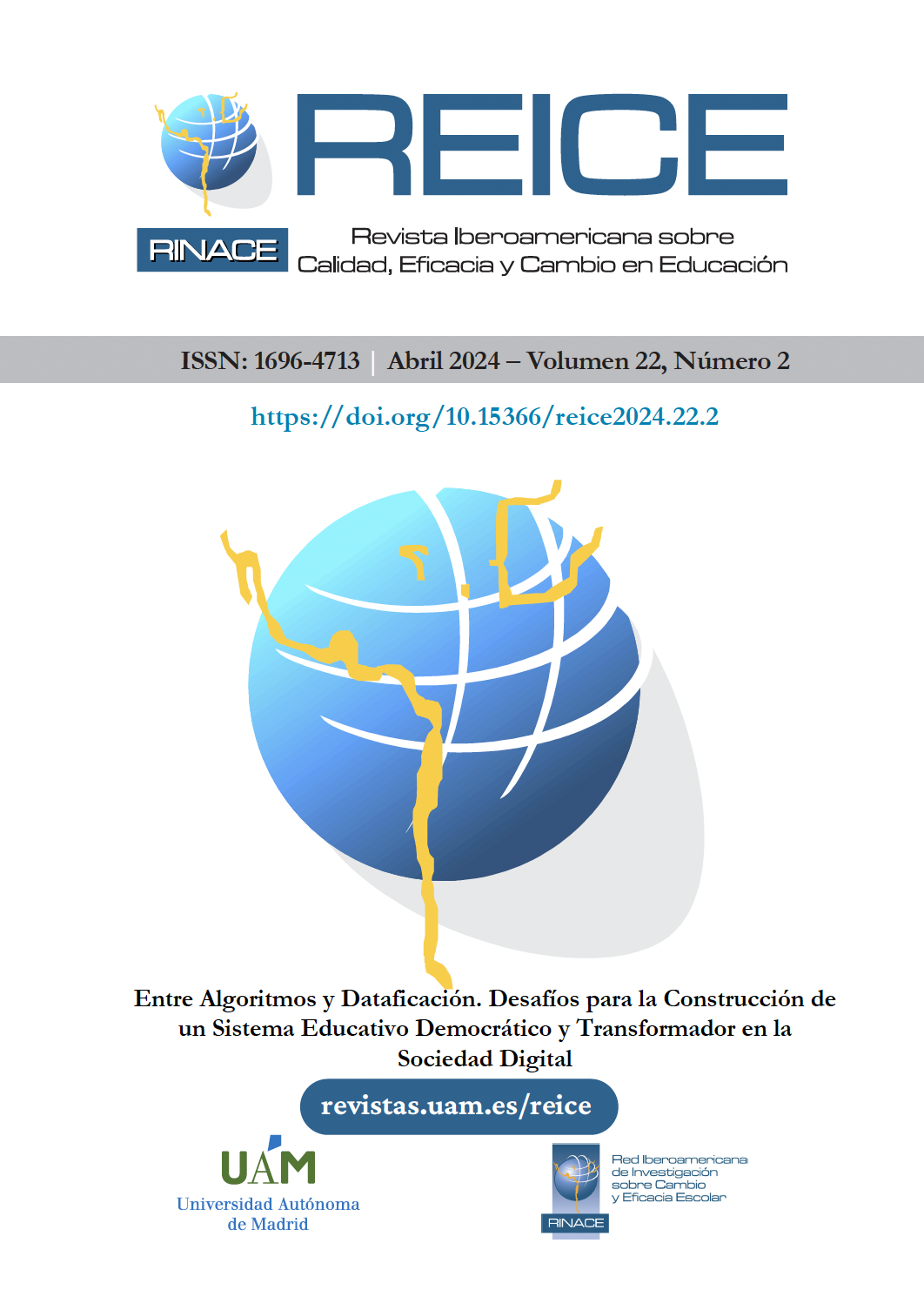Metrics, Subjectivity and Meritocracy in Academic Work
Keywords:
Datafication, Meritocracy, Evaluation, Education, Culture
This work is licensed under a Creative Commons Attribution-NonCommercial-NoDerivatives 4.0 International License.
Abstract
The proliferation of measurement instruments that datify performance are expressions of the relevance of the culture of meritocratic evaluation in contemporary organizations. In universities, researchers are subject to constant evaluations of their performance, and they are evaluated in coherence with this datification. In this research we seek to understand how academics interact with performance datification devices in the context of a meritocratic regime. To this end, we conducted sixty interviews with high-performing academics in Chile through the analysis of interpretative repertoires, identifying four categories: 1) The evaluation returns a personal image where performance is explained by magical voluntarism, 2) The evaluation constructs a prestige limit that indicates who deserves recognition, 3) Critical distance is generated with respect to the use of evaluation devices, and 4) A playful relationship is established with the evaluation devices that allows them to be used for personal purposes. The conclusion points to the emergence of an academic subject who resolves the contradictions of these repertoires by betting on merit as the best indicator of his or her place in the academy with respect to his or her peers.
Downloads
References
Barbosa, L. (2010). Igualdade e meritocracia: A ética do desempenho nas sociedades modernas. Editora FGV.
Batthyany, K. y Vommaro, P. (2022). Pensar la pandemia desde las ciencias sociales y las humanidades. CLACSO.
Beigel, F. (2014). Publishing from the periphery: Structural heterogeneity and segmented circuits. The evaluation of scientific publications for tenure in Argentina’s CONICET. Current Sociology, 62(5), 743-765. https://doi.org/10.1177/0011392114533977
Ben-Amar, W., Bujaki, M., McConomy, B. y McIlkenny, P. (2021). Gendering merit: How the discourse of merit in diversity disclosures supports the gendered status quo on Canadian corporate boards. Critical Perspectives on Accounting, 75, 102170. https://doi.org/10.1016/j.cpa.2020.102170
Bernasconi, A. (2010). La apoteosis del investigador y la institucionalización de la profesión académica en Chile. Estudios sobre Educación, 19, 139-163. https://doi.org/10.15581/004.19.4584
Bernasconi, A. y Rojas, F. (2003). Informe sobre la educación superior en Chile: 1980-2003. UNESCO.
byrd, d. (2019). The diversity distraction: A critical comparative analysis of discourse in higher education scholarship. The Review of Higher Education, 42(5), 135-172. https://doi.org/10.1353/rhe.2019.0048
Castilla, E. y Benard, S. (2010). The paradox of meritocracy in organizations. Administrative Science Quarterly, 55(4), 543-576.
Castillo, J. C., Torres, A., Atria, J. y Maldonado, L. (2019). Meritocracia y desigualdad económica: Percepciones, preferencias e implicancias. Revista Internacional de Sociología, 77(1), e117. https://doi.org/10.3989/ris.2019.77.1.17.114
Chiappa, R. y Pérez Mejías, P. (2019). Unfolding the direct and indirect effects of social class of origin on faculty income. Higher Education, 78, 529-555. https://doi.org/10.1007/s10734-019-0356-4
Chiau, A. y Panucci-Filho, L. (2016). Custos nas instituições federais de ensino superior: Análise comparativa entre duas universidades federais do sul do Brasil. REICE. Revista Iberoamericana sobre Calidad, Eficacia y Cambio en Educación, 12(1), 57-73. https://doi.org/10.15366/reice2014.12.1.004
Corbin, J. y Strauss, A. (1990). Grounded theory research: Procedures, canons, and evaluative criteria. Qualitative Sociology, 13(1), 3-21. https://doi.org/10.1007/BF00988593
Dahler-Larsen, P. (2011). The evaluation society. Stanford University Press
Eagleton, T. (1997). Ideología. Paidós.
Etzkowitz, H. (2003). Research groups as ‘quasi-firms’: The invention of the entrepreneurial university. Research Policy, 32(1), 109-121. https://doi.org/10.1016/S0048-7333(02)00009-4
Fardella, C., Corvalán-Navia, A. y Zavala, R. (2019). El académico cuantificado. La gestión performativa a través de los instrumentos de medición en la ciencia. Psicología, Conocimiento y Sociedad, 9(2), 62-78. https://doi.org/10.26864/pcs.v9.n2.15
Flick, U. (2004). Introducción a la investigación cualitativa. Morata.
Gaulejac, V. (2014). Gestão como doença social. Ideias & Letras.
Han, B. (2012). La sociedad de la transparencia. Herder.
Kreimer, P. (2011). La evaluación de la actividad científica: desde la indagación sociológica a la burocratización. Dilemas actuales. Propuesta Educativa, 20(36), 59-77.
Kreimer, P. y Vessuri, H. (2017). Latin American science, technology, and society: a historical and reflexive approach. Tapuya: Latin American Science, Technology and Society, 1(1), 17-37. https://doi.org/10.1080/25729861.2017.1368622
Lamont, M. (2012). Toward a comparative sociology of valuation and evaluation. Annual Review of Sociology, 38(1), 201-221. https://doi.org/10.1146/annurev-soc-070308-120022
Martín Rivero, R. (2007). La Eficiencia Productiva en el Ámbito Universitario: Aspectos Claves para su Evaluación. Estudios de Economía Aplicada, 25(3), 793-811.
McNamee, S. y Miller, R. (2009). The meritocracy myth. Rowman & Littelfield.
Mijs, J., y Savage, M. (2020). Meritocracy, elitism and inequality. The Political Quarterly, 91(2), 397-404.
Ministerio de Ciencia, Tecnología, Conocimiento e Innovación. (2020). Política nacional de ciencia, tecnología, conocimiento e innovación. MINCIENCIA.
Munoz, D. A. (2016). Assessing the research efficiency of higher education institutions in Chile: A data envelopment analysis approach. International Journal of Educational Management, 30(6), 809-825. https://doi.org/10.1108/IJEM-03-2015-0022
OECD. (2018). Educación en Chile. Revisión de políticas nacionales de educación. OECD Publishing. https://doi.org/10.1787/9789264288720-es.
Power, M. (1999). The audit society. Rituals of verification. Oxford University Press
Ramírez-Casas del Valle. L., Baleriola, E., Sisto, V., López, V. y Aguilera, F. (2020). La managerialización del aula: la gramática del rendimiento desde las narrativas de los estudiantes. Currículo sem Fronteiras, 20(3), 950-970. https://doi.org/10.35786/1645-1384.v20.n3.17
Rivera-Vargas, P. Cobo, C., Jacovkis, J. y Passerón, E. (2023). Data centres in the university: from tools to symbols of power and transformation. En J. Raffaghelli y A. Sangrà (Eds.), Data cultures in higher education. Higher education dynamics (pp. 329-353). Springer. https://doi.org/10.1007/978-3-031-24193-2_14
Said, E. (1993). Cultura e imperialismo. Anagrama.
Sandel, M. (2020). La tiranía del mérito. ¿Qué ha sido del bien común? Debate.
Savvina, O. (2019). The prevalence of scientific misconduct and principles of the contemporary scientists. Atlantis Press. https://doi.org/10.2991/iccessh-19.2019.363
Silverman, D. (1997). Qualitative research: Theory, method and practice. Sage.
Sisto, V. (2019). Inclusión “a la chilena”: La inclusión escolar en un contexto de políticas neoliberales avanzadas. Education Policy Analysis Archives, 27, 23-44. https://doi.org/10.14507/epaa.27.3044
Torres, C. A. y Schugurensky, D. (2002). The political economy of higher education in the era of neoliberal globalization: Latin America in comparative perspective. Higher Education, 43(4), 429-455. https://doi.org/10.1023/A:1015292413037
Wetherell, M. y Potter, J. (1998). El análisis del discurso y la identificación de los repertorios interpretativos. En A. Gordo y J. Linaza (Eds.), Psicología, discurso y poder: Metodologías cualitativas, perspectivas críticas (pp. 63-78). Visor.

